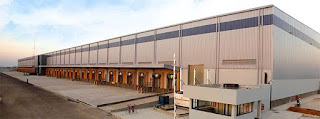Leasing Warehousing Spaces: Do’s and Dont’s
Warehousing is the complete activity of shipping and storing
goods and ready products for consumption. The most important asset of a
warehousing system is its automated storages and handling facilities. The
warehousing industry has its grip over most of the businesses as they require
spaces to store their raw materials or finished products with precision so as
to process them as per requirement.
Warehousing takes away the load of the manufacturers as they
have answers to the complicated problems of a company such as where to store
their products and how should they be
placed optimally so that it is cost effective. The requirement for these
activities is a well-directed, scientific, and sensible approach toward the warehousing
function.
Modern Trends
The globalisation has affected the warehousing industry
positively as the growth of customer base and the the industrial interaction
has provided larger and wider scopes to manage better manufacturers. The
warehouse companies now have best storage and transport facilities available
which helps them beat the challenges encountered while troubleshooting for
producers and clients. The warehouse
spaces in Delhi have all the global features available and are good
enough to serve any type of
manufacturing sector.
Another common trend developed in the industry is the use of
Radio frequency identification that allows a machine to store and retrieve
goods in the warehouse on the basis of the label number assigned on the
package. This improves the productivity within work hours and it saves time and
is very cost effective. Warehousing companies being the party logistics service
is also a very common trend seen nowadays. This has improved the accuracy and
productivity of the manufacturers as they have taken over the major problems of
the producers of storage and transportation.
The technology is continuously being upgraded in the industry. Some of the latest example
observed are ERP software, storage
technology, warehousing distribution method, warehousing storage software,
inventory software, etc. The advanced technology helps the management of
logistics and warehouse keep a keen eye on the dimensions of the commodity and
get an optimal solution of their storage in an economic manner. There has been a 70 percent improvement in operational
efficiency due to the advanced technology.
Apart from the general work of storage, warehouse is also
involved in packaging and labelling of the products while they move in and out
of the facility. To protect the goods against damages and ensure a safe
delivery of the items the packaging is most important. Along with this the
packages have to labelled and tagged efficiently so that the management becomes
easier. The tracking of the items needs to be 100 percent functional and labelling
of the items is important as the technology will help increase the work
efficiency.
Types, Services, and
Criteria for Selecting Warehouse
The most commonly used warehouses are
●
private warehouses
●
public warehouses,
●
climate-controlled warehouses,
●
distribution-centered warehouses,
●
cross docking and transloading warehouses,
●
and break bulk warehouses.
These are the services offered in a warehouse:
●
warehousing and distribution services,
●
logistics,
●
packaging,
●
reverse logistics,
●
stuffing and destuffing,
●
palletizing,
●
Insurance,
●
Labeling And
●
knitting and
final assembly.
An Industrial real estate developer has to
make sure that they fulfill all the major criteria of the warehousing space so
that they can easily lease it to companies. The criteria used to select a
warehouse are:
●
layout and design
●
flow of material
●
size of warehouse,
●
Staging area,
●
accessibility,
●
trailer storage capacity,
●
turning lane size and
●
connectivity.



Nice blog post, thanks for sharing.
ReplyDeleteWarehousing services | Transportation services